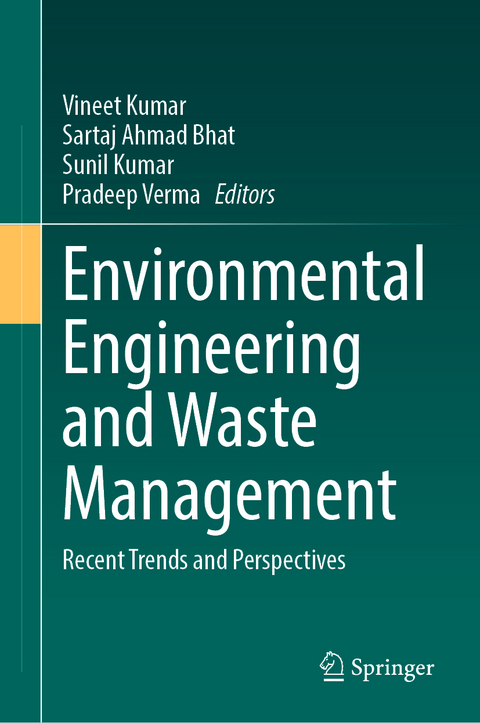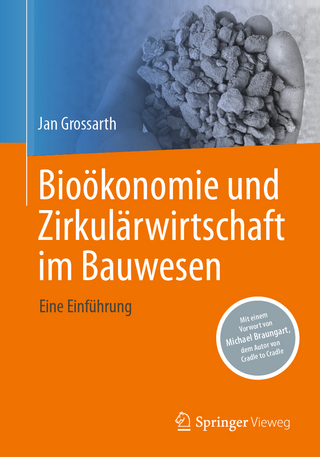
Environmental Engineering and Waste Management
Springer International Publishing (Verlag)
978-3-031-58440-4 (ISBN)
This book presents fundamental principles and recent advancements in managing waste in an environmentally sustainable manner. It explores a wide array of methods and technologies designed to transform waste, thereby reducing health impacts across various stages such as waste minimization, transportation, handling, storage, and disposal of solid wastes. Moreover, the book delves into waste-contaminated site assessment methods, environmental issues and impacts, as well as the latest regulatory and policy statutes. The inclusion of case studies allows for the assessment of diverse waste management challenges, showcasing how environmental engineering methods can be applied to process industrial waste sustainably. For instance, certain sections of the book delve into the intricate microbial communities and their metabolic pathways, illustrating their role in the remediation and management of municipal waste at landfill sites. This book caters to a broad audience, including teachers, researchers, practitioners, environmental engineers, chemical engineers, soil scientists, policymakers, and students specializing in environmental engineering, chemical engineering, environmental biotechnology, and environmental science.
Vineet Kumar is working as a National Postdoctoral Fellow (N-PDF) in the Department of Microbiology at Central University of Rajasthan, India. He received his M.Sc. and M.Phil. in Microbiology from the Department of Microbiology at Ch. Charan Singh University, Meerut, India. Subsequently, he earned his Ph.D. in Environmental Microbiology from Babasaheb Bhimrao Ambedkar (A Central) University, Lucknow, India in 2018. His research interests include waste management, bioremediation, phytoremediation, metagenomics, wastewater treatment, environmental monitoring, bioplastic, and biofuel production. He has published more than 50 articles in peer-reviewed international journals of repute, 55 book chapters, 1 technical report, and 4 scientific magazine articles, with more than citations 2500, and h-index 31. In addition, he has published 2 authored and 22 edited books on various aspects of science and engineering by renowned international publishers. He has been serving as a guest editor and reviewer in more than 65 International Journals for his research area. He is an active member of numerous scientific societies including the Microbiology Society (UK), the Indian Science Congress Association (India), the Association of Microbiologists of India (India), the Biotech Research Society (India). He is serving as the President of Society for Green Environment, India (website: www.sgeindia.org).
Sartaj Ahmad Bhat is working as a JSPS Postdoctoral Researcher at the River Basin Research Center, Gifu University, Japan. He received his Ph.D. in Environmental Sciences from Guru Nanak Dev University, Amritsar, India in 2017. His research interests focus on vermicomposting treatment of various solid wastes, especially for investigations on fate and behavior of emerging pollutants during biological treatment of organic wastes. He has published more than 65 papers in peer-reviewed journals and edited over 15 books published by Elsevier Science, CRC Press, Royal Society of Chemistry, International Water Association and Springer Nature. Dr. Bhat is serving as an Associate/Academic Editor and Editorial Board Member/ Advisory Board Member of more than 20 journals published by Frontiers, Springer, Elsevier, PLOS, Hindawi, and De Gruyter. Dr. Bhat is a recipient of several prestigious awards such as the JSPS Postdoctoral Fellowship to pursue research at River Basin Research Center, Gifu University, Japan, the Basic Scientific Research Fellowship (BSR JRF, SRF) by the University Grants Commission (UGC) India, the DST-SERB National Postdoctoral Fellowship at CSIR-NEERI, Nagpur, India and Swachhta Saarthi Fellowship by the Govt. of India. Dr. Bhat has also received the 2020 Outstanding Reviewer Award by the International Journal of Environmental Research and Public Health, MDPI, and the Top Peer Reviewer 2019 Award in Environment and Ecology by Web of Science and has more than 800 Verified Reviews and 75 Editor Records to his credit.
Sunil Kumar is a well-rounded researcher with more than 22 years of experience in leading, supervising, and undertaking research in the broader field of Environmental Engineering and Science with a focus on Solid and Hazardous Waste Management. Dr. Kumar is a graduate of Environmental Engineering and Management from the Indian Institute of Technology, Kharagpur, India. He completed his Ph.D. in Environmental Engineering from Jadavpur University, Kolkata, India. His primary area of expertise is solid waste management (Municipal Solid Waste, Electronic waste etc.) over a wide range of environmental topics including contaminated sites, EIA, and wastewater treatment. His contributions in these fields led to a citation of 14972, an h-index of 60, and an i10-index of 246 (Google Scholar). His contributions since inception at CSIR-National Environmental Engineering Research Institute (NEERI), India in 2000 include 261 refereed publications, 05 books, 40 book chapters, 10 edited volumes, and numerous project r
Part I Waste and Impact.- Chapter 1 Emerging contaminants of tannery sludge and their environmental impact and health hazards.- Chapter 2 Municipal solid waste collection, transportation, and segregation.- Chapter 3 Industrial wastewater sludge management.- Part II Waste Recycling, Reuse, and Resource Recovery.- Chapter 4 Sewage sludge.- Chapter 5 Sustainable solutions.- Chapter 6 Construction and demolition waste management.- Chapter 7 Approaches involved in the treatment and disposal of petroleum refinery sludge.- Chapter 8 Waste Management in COVID-19 Pandemic.- Chapter 9 Circular cement decarbonization.- Chapter 10 Novel approaches for greener synthesis of extremozymes using agro/food waste.- Chapter 11 Microplastic waste management in textile industry wastewater.- Chapter 12 Agri-food waste management and treatment approaches for environmental sustainability.- Part III Environmental Technologies.- Chapter 13 Landfill Biomining of legacy waste dumpsites in India.- Chapter 14 Harnessing microbial recycling of organic wastes in a circular waste management system for greenhouse gas reduction.- Chapter 15 Profiling of microbial community and their role in solid waste treatment.- Chapter 16 Composting and vermitechnology in organic waste management.- Chapter 17 Advancing phytoremediation from lab research to field applications.- Chapter 18 Advancements in biomass degradation.- Part IV Recent Trends and Development.- Chapter 20 Integrated environmental technologies for waste management.- Chapter 21 Integrated physicochemical and biological treatment processes and resource recovery as futuristic approach for management of paper and pulp industry effluent. Chapter 22 Circular waste management system and green house gases reduction.- Chapter 23 Industry 4.0.- Chapter 24 Life cycle and cost estimation of solid waste management practices.
| Erscheinungsdatum | 06.07.2024 |
|---|---|
| Zusatzinfo | XXX, 738 p. 115 illus., 106 illus. in color. |
| Verlagsort | Cham |
| Sprache | englisch |
| Maße | 155 x 235 mm |
| Themenwelt | Naturwissenschaften ► Biologie ► Ökologie / Naturschutz |
| Technik | |
| Schlagworte | biosolids • Environmental Engineering • Industrial wastewater • waste management • Waste Recycling |
| ISBN-10 | 3-031-58440-6 / 3031584406 |
| ISBN-13 | 978-3-031-58440-4 / 9783031584404 |
| Zustand | Neuware |
| Haben Sie eine Frage zum Produkt? |
aus dem Bereich


